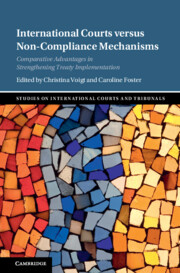International Courts versus Non-Compliance Mechanisms
This book explores the best mechanisms for helping bring about states’ compliance with international treaties. Many recent treaties include non-compliance mechanisms (NCMs) to facilitate implementation and promote parties’ compliance with their obligations. These NCMs exist alongside the formal dispute resolution processes of international courts and tribunals. The authors bring together a wide legal spectrum of views from different parts of the world representing novel insights into NCMs’ contribution to treaty implementation and compliance. Their research has cast important light on how procedural innovations may help render NCMs more effective, as well as on the circumstances in which NCMs may be better suited than international courts to facilitate compliance. This applies in particular to issues where states share common interests, such as environmental or human rights protection, that are interdependent, and where implementation makes significant administrative, regulatory and political demands. To enable this research to make an impact around the world, this book is also available as Open Access on Cambridge Core.
Christina Voigt is Professor of Law at the University of Oslo; Chair of the IUCN World Commission on Environmental Law; and Co-Chair of the Paris Agreement Implementation and Compliance Committee. She is a renowned expert in international environmental law and has taught and published widely in this field. She is the editor of, inter alia, International Judicial Practice on the Environment: Questions of Legitimacy (Cambridge University Press 2019) and Courts and the Environment (co-edited with Zen Makuch, Edward Elgar 2018).
Caroline Foster is Professor of International Law at the University of Auckland and Director of the New Zealand Centre for Environmental Law. She is the author of Global Regulatory Standards in Environmental and Health Disputes: Regulatory Coherence, Due Regard and Due Diligence (Oxford University Press 2021) and Science and the Precautionary Principle in International Courts and Tribunals: Expert Evidence, Burden of Proof and Finality (Cambridge University Press 2011).



